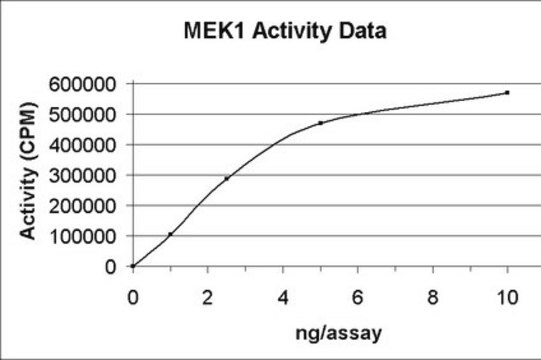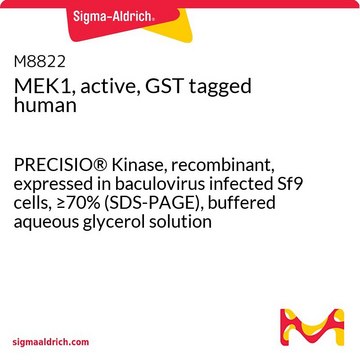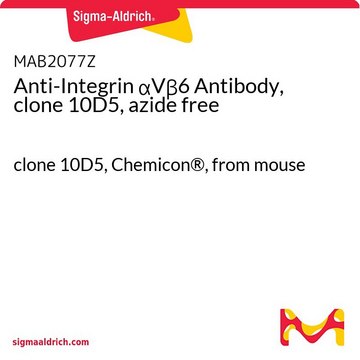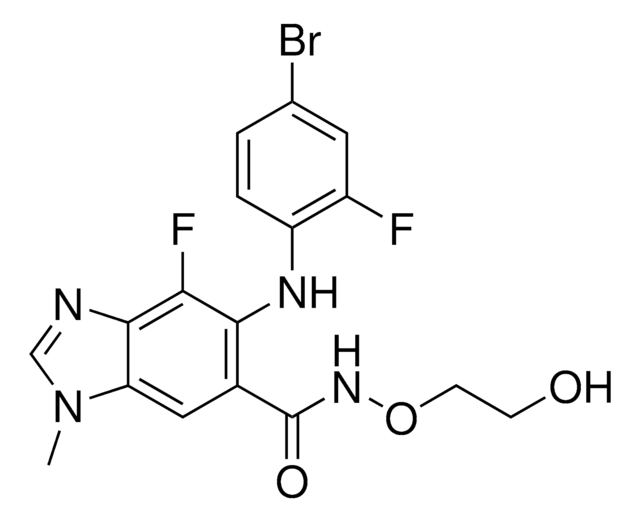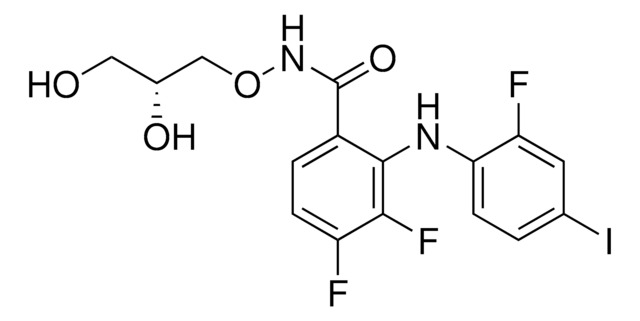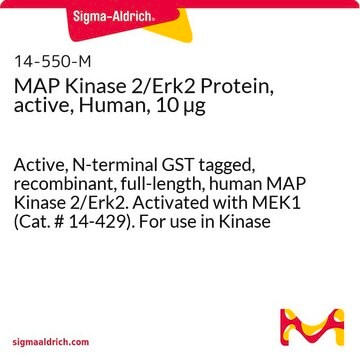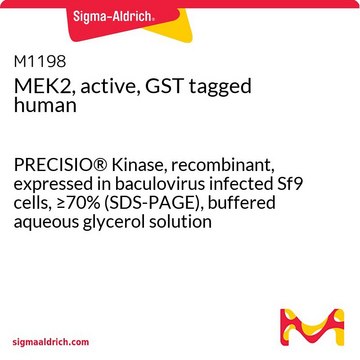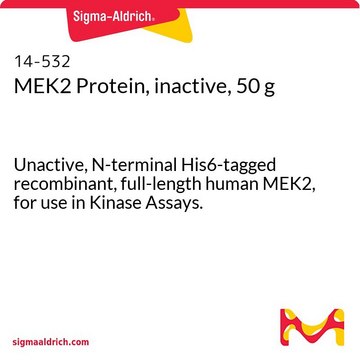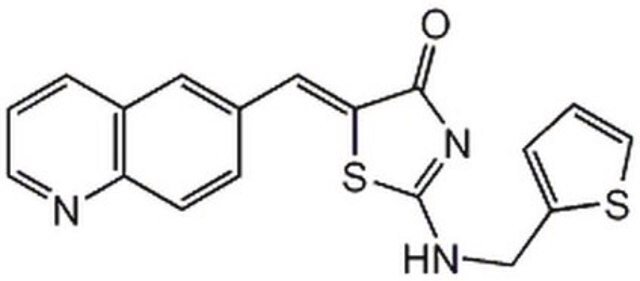14-420
MEK1 Protein, inactive, 50 g
Unactive, N-terminal GST & C-terminal His6-tagged, recombinant full-length human MEK1, for use in Kinase Assays.
Synonim(y):
MEK1 Protein
Zaloguj sięWyświetlanie cen organizacyjnych i kontraktowych
About This Item
Kod UNSPSC:
12352202
eCl@ss:
32160405
NACRES:
NA.41
Polecane produkty
pochodzenie biologiczne
human
Poziom jakości
rekombinowane
expressed in E. coli
masa cząsteczkowa
Mw 71 kDa
producent / nazwa handlowa
Upstate®
metody
activity assay: suitable (kinase)
numer dostępu NCBI
numer dostępu UniProt
Warunki transportu
dry ice
informacje o genach
human ... MAP2K1(5604)
Opis ogólny
Research area: CELL SIGNALING
N-terminal GST, and C-terminal His6-tagged, recombinant full-length human MEK1
Product Source: expressed in E.coli
MEK1, also known as Mitogen-Activated Protein Kinase Kinase 1 (MAP2K1), is a protein kinase located on chromosome 15q22.1-q22.33, consisting of 12 exons and 393 amino acids. The protein is made up of two lobes containing several conserved α-helices and β-strands.
N-terminal GST, and C-terminal His6-tagged, recombinant full-length human MEK1
Product Source: expressed in E.coli
MEK1, also known as Mitogen-Activated Protein Kinase Kinase 1 (MAP2K1), is a protein kinase located on chromosome 15q22.1-q22.33, consisting of 12 exons and 393 amino acids. The protein is made up of two lobes containing several conserved α-helices and β-strands.
Zastosowanie
Mitogen-Activated Protein Kinase Kinase 1 has been used in in vitro kinase assays:
- to elucidate the underlying mechanisms involved in the response to Rapidly Accelerated Fibrosarcoma (RAF) inhibitors and the interactions with downstream pathways.
- to investigate the role of Mitogen-Activated Protein Kinase Kinase Kinase 2 (MEKK2) as a MAP3K in the Extracellular Signal-Regulated Kinase (ERK) pathway in osteoblasts and to assess its potential as a therapeutic target for treating Neurofibromatosis Type 1 (NF1).
- to assess the effectiveness of the combined targeted therapy with Dabrafenib and Trametinib in treating non-small cell lung cancers (NSCLCs).
Działania biochem./fizjol.
Protein Target: MEK1
Target Sub-Family: STE Mitogen-Activated Protein Kinase Kinase 1 (MEK1) is involved in the RAS-RAF-MEK-ERK signaling pathway. This pathway plays a crucial role in various cellular processes, including apoptosis, cell cycle progression, migration, differentiation, metabolism, and proliferation. One of its important functions is the phosphorylation of specific sites in extracellular signal-regulated kinases (ERKs) Mitogen-Activated Protein Kinase /Extracellular Signal-Regulated Kinase (MAPK3/ERK1 and MAPK1/ERK2). MEK activation is closely associated with stimulating cell growth and transformation processes.
Target Sub-Family: STE Mitogen-Activated Protein Kinase Kinase 1 (MEK1) is involved in the RAS-RAF-MEK-ERK signaling pathway. This pathway plays a crucial role in various cellular processes, including apoptosis, cell cycle progression, migration, differentiation, metabolism, and proliferation. One of its important functions is the phosphorylation of specific sites in extracellular signal-regulated kinases (ERKs) Mitogen-Activated Protein Kinase /Extracellular Signal-Regulated Kinase (MAPK3/ERK1 and MAPK1/ERK2). MEK activation is closely associated with stimulating cell growth and transformation processes.
Jakość
routinely evaluated by phosphorylation of MBP (Catalog # 13-104) substrate in vitro
Postać fizyczna
glutathione-agarose followed by Ni2+/NTA-agarose
Przechowywanie i stabilność
6 months at -70°C
Inne uwagi
For Specific Activity data, refer to the Certificate of Analysis for individual lots of this enzyme.
Informacje prawne
UPSTATE is a registered trademark of Merck KGaA, Darmstadt, Germany
Oświadczenie o zrzeczeniu się odpowiedzialności
Unless otherwise stated in our catalog or other company documentation accompanying the product(s), our products are intended for research use only and are not to be used for any other purpose, which includes but is not limited to, unauthorized commercial uses, in vitro diagnostic uses, ex vivo or in vivo therapeutic uses or any type of consumption or application to humans or animals.
This page may contain text that has been machine translated.
Hasło ostrzegawcze
Warning
Zwroty wskazujące rodzaj zagrożenia
Zwroty wskazujące środki ostrożności
Klasyfikacja zagrożeń
Skin Sens. 1
Kod klasy składowania
12 - Non Combustible Liquids
Klasa zagrożenia wodnego (WGK)
WGK 2
Temperatura zapłonu (°F)
Not applicable
Temperatura zapłonu (°C)
Not applicable
Certyfikaty analizy (CoA)
Poszukaj Certyfikaty analizy (CoA), wpisując numer partii/serii produktów. Numery serii i partii można znaleźć na etykiecie produktu po słowach „seria” lub „partia”.
Masz już ten produkt?
Dokumenty związane z niedawno zakupionymi produktami zostały zamieszczone w Bibliotece dokumentów.
Ingo V Hartung et al.
ChemMedChem, 10(12), 2004-2013 (2015-11-07)
Having recently identified a so-far unexplored area adjacent to the known binding site of allosteric mitogen-activated protein kinase kinase (MEK) inhibitors, we now report an extension of these studies by combining our new side chains with different MEK inhibitor cores
David S Nelson et al.
Genes, chromosomes & cancer, 54(6), 361-368 (2015-04-23)
Langerhans cell histiocytosis (LCH) is now understood to be a neoplastic disease in which over 50% of cases have somatic activating mutations of BRAF. However, the extracellular signal-related (ERK) pathway is activated in all cases including those with wild type
P Zhang et al.
The Journal of biological chemistry, 275(29), 22479-22486 (2000-05-10)
Activation of ERK-1 and -2 by H(2)O(2) in a variety of cell types requires epidermal growth factor receptor (EGFR) phosphorylation. In this study, we investigated the activation of ERK by ONOO(-) in cultured rat lung myofibroblasts. Western blot analysis using
O Zugasti et al.
Molecular and cellular biology, 21(19), 6706-6717 (2001-09-05)
Signals from the extracellular matrix are essential for the survival of many cell types. Dominant-negative mutants of two members of Rho family GTPases, Rac1 and Cdc42, mimic the loss of anchorage in primary mouse fibroblasts and are potent inducers of
M Dolores García-Fernández et al.
Cell reports methods, 1(8), None-None (2022-01-04)
Ligand-gated ion channels (LGICs) are natural biosensors generating electrical signals in response to the binding of specific ligands. Creating de novo LGICs for biosensing applications is technically challenging. We have previously designed modified LGICs by linking G protein-coupled receptors (GPCRs)
Nasz zespół naukowców ma doświadczenie we wszystkich obszarach badań, w tym w naukach przyrodniczych, materiałoznawstwie, syntezie chemicznej, chromatografii, analityce i wielu innych dziedzinach.
Skontaktuj się z zespołem ds. pomocy technicznej